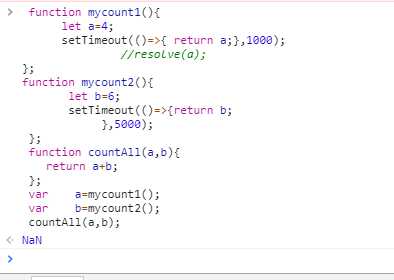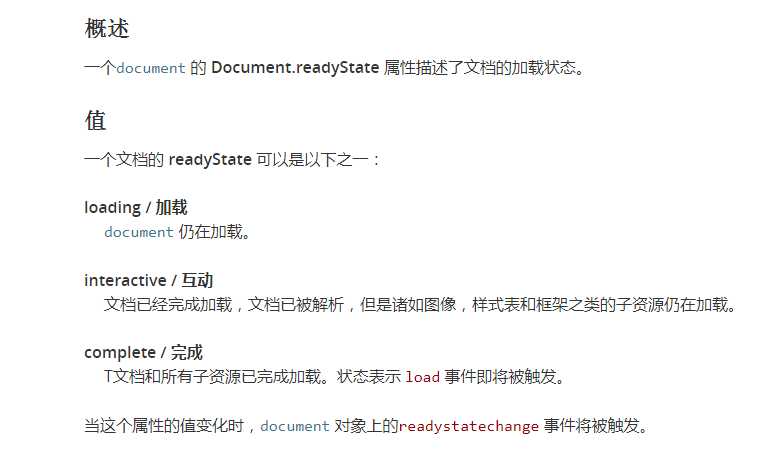标签:cat end syn com 原理 自动 编程 var dev
这里只讲promise,和async的使用方法,不会讲他们的原理。
Promise 是异步编程的一种解决方案,可以用于取代传统的回调函数,该变那些函数层层嵌套调用的尴尬局面。
1)promise
基本语法:
var p= new Promise(function(resolve,reject){ if(....) resolve(); else reject(.....); }); p.then(function(){//resolve ....... }).catch(function(){//reject ......... });
基本意思就是:每一个promise都有两种状态(对应着请求的pending->fulfiled,pending---->rejected)
pending->fulfiled:表示成功,执行then()的第一个回调函数
pending-->rejected失败,执行then()的第二个回调函数,一般我们更习惯用catch();更周全
demo01:使用vue,axios,promise演示一下promise到底是啥???
首先在组件中定义了一个getList()
getList(){ const self=this; let promise=new Promise(function(resolve,reject){ /* resolve((function(){ axios.get(‘./dataAction.php‘).then(function(res){ self.list=res.data; }).catch(function(error){}); return self.list })()); */ axios.get(‘./dataAction.php‘).then(function(res){ self.list=res.data; resolve(res.data); }).catch(function(error){}); });
promise.then(function(res){
console.log("我要等待axios请求之后再执行");
console.log(res);
}).then(function(){
});
在组件挂在之后就会触发这个方法,
mounted(){ this.getList(); //this.countMethod(); }
为了演示出效果我在php代码中做了延时处理:(目的是为了延时四秒之后返回结果,这样前端就是一个漫长的等待过程)
<?php $dsn="mysql:dbname=vue;host=127.0.0.1"; $user="root"; $password=‘‘; $db= new PDO($dsn,$user,$password); $sta= $db->prepare("select * from res"); $sta->execute(); $arr=array(); while($row=$sta->fetch(PDO::FETCH_ASSOC)){ //print_r($row); $arr[]=$row; } $interval=4; sleep($interval); print_r( json_encode($arr)); ?>
你会发现确实过了四秒中上面那两句红色的才执行。。。。。。。。
既然现在框架ajax一般都有的自己promise,那我们何必要学习了??
现在我的需求是,有三个很普通函数,不涉及到请求,这三个函数都有一个延迟函数settimeout,返回一个数字,另外还有一个函数用于接受他们的返回参数,进行相加,返回结果??
按照我们的理解settimeout会在主程序执行完之后才执行,这样我们根本就不能获得相加的结果
demo02:
function mycount1(){ let a=4; setTimeout(()=>{ return a;},1000);
//resolve(a);
},
function mycount2(){ let b=6; setTimeout(()=>{resolve(b);
},5000); }, function countAll(a,b){
return a+b;
} var a=mycount1();
var b=mycount2();
countAll(a,b);

现在我们有了promise,那么这一切就好说了
因为有多个执行过程,这个时候我想到了promise.all([......]).then();
语法作用就是all([.....])中可以有多个promise对象,等他们都执行成功之后才会触发后面的then(),,[前提是都执行成功之后]
function mycount1(){
return new Promise(function(resolve,reject){
let a=4;
setTimeout(()=>{resolve(a)},1000);
//resolve(a);
});
/*
return Promise.resolve((function(){
setTimeout(()=>{return 4},4000);
})())
*/
};
function mycount2(){
let b=6;
return new Promise(function(resolve,reject){
setTimeout(()=>{resolve(b);},5000); });
};
function countAll(a,b){
console.log("我是最后执行的");
console.log(a+b);
};
const m1=mycount1().then((a)=>{console.log(a); return a;});
const m2=mycount2().then((b)=>{console.log(b); return b;});
//此时m1,m2都是promise对象
Promise.all([m1,m2]).then(function([a,b]){
countAll(a,b);
});

这里在给一个promise.all([])的例子
getList3(){ const self=this; const a1=axios.get(‘./dataAction.php‘);//axios请求之后返回一个promise const a2=axios.get(‘./dataAction.php‘);//axios请求之后返回一个promise //两个promise返回两个参数,因此我们就用数组接受参数(如果只用一个参数接受,他会自动变成一个数组) //首先promise.all的参数是promise数组集合 Promise.all([a1,a2]) .then(([r1,r2]) => { console.log(r1); // let arr=[]; //arr.push(...r1); console.log(r2); });
},
mounted(){
//this.getList();
//this.countMethod();
this.getList3();
}

讲了这么多不是为了好玩,在项目中我们是不是有很多情况下,是需要在某一个函数执行完之后再执行另一个函数的,
例如页面的加载完之后,或者dom树加载完之后,当然学过js的同学知道,页面加载有一个document.readyState的几个状态
https://developer.mozilla.org/zh-CN/docs/Web/API/Document/readyState

然后就有了我们经常用的
1)网站所有的资源都加载完毕才执行
window.onload=function(){};
2)dom树加载完之后执行,先于window.onload;
$(function(){});//或者$(document).ready(function(){......});
当然promise还有其他的api,你可以google自己学习下,
例如:Promise.resolve(.....)可以将一个非promise对象包装成一个promise,这样就可以使用then方法了
标签:cat end syn com 原理 自动 编程 var dev
原文地址:http://www.cnblogs.com/evaling/p/7440871.html